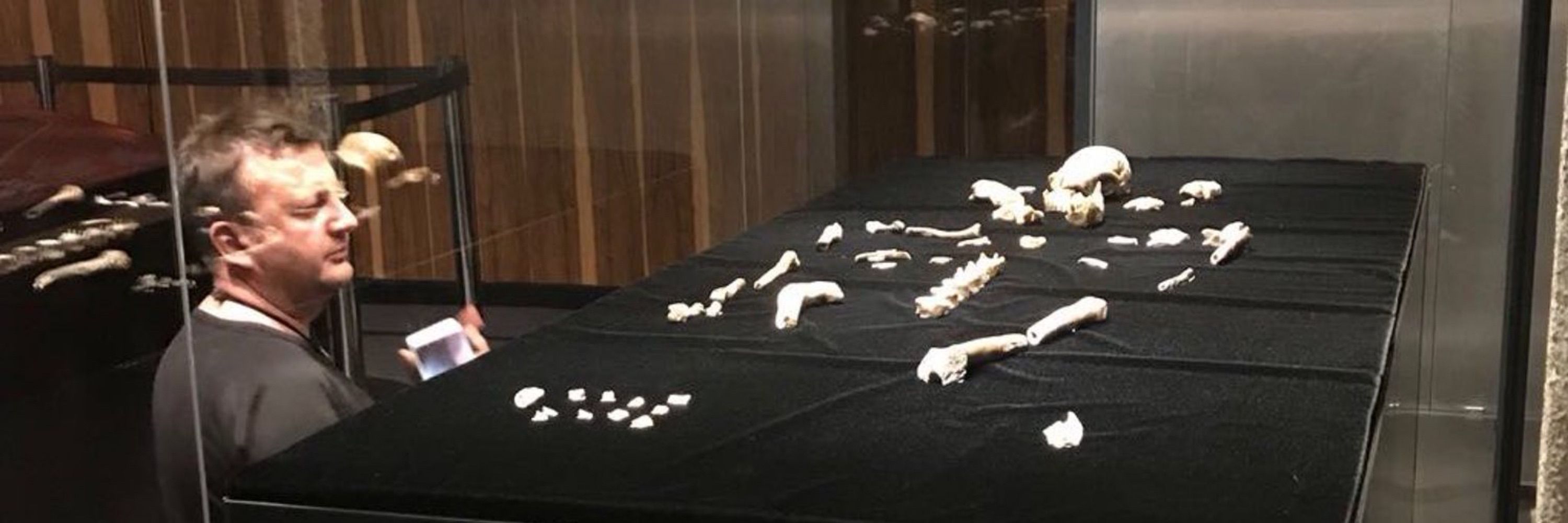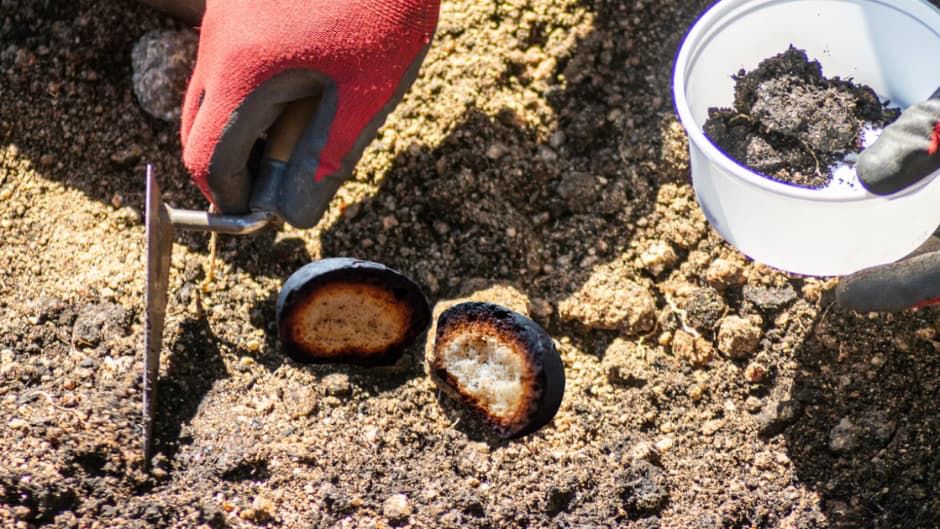
Karl
@karlhannant.bsky.social
“the amount of energy needed to refute bullshit is an order of magnitude bigger than to produce it”.
Archaeology, Anthropology, Scottish highlands, whisky, wine and atheist ⚱️🏺
https://www.facebook.com/share/g/17ywBsKzzb/?mibextid=K35XfP
Archaeology, Anthropology, Scottish highlands, whisky, wine and atheist ⚱️🏺
https://www.facebook.com/share/g/17ywBsKzzb/?mibextid=K35XfP
Stone tools, animal bones and other artifacts unearthed in Malta indicate that humans first inhabited the island 8,5kbp, about a 1k years earlier than previously thought. To reach Malta, these hunter-gatherers crossed at least 100 kilometers of open ocean⚱️🏺
www.sciencenews.org/article/ston...
www.sciencenews.org/article/ston...

Stone Age hunter-gatherers may have been surprisingly skilled seafarers
New archaeological finds in Malta add to an emerging theory that early Stone Age humans cruised the open seas.
www.sciencenews.org
April 9, 2025 at 4:42 PM
Stone tools, animal bones and other artifacts unearthed in Malta indicate that humans first inhabited the island 8,5kbp, about a 1k years earlier than previously thought. To reach Malta, these hunter-gatherers crossed at least 100 kilometers of open ocean⚱️🏺
www.sciencenews.org/article/ston...
www.sciencenews.org/article/ston...
Digital technology reveals ‘incredibly modern’ royal who lived 3,500 years ago in kingdom associated with Helen of Troy
🏺⚱️
www.theguardian.com/education/20...
🏺⚱️
www.theguardian.com/education/20...

‘Peering into the eyes of the past’: reconstruction reveals face of woman who lived before Trojan war
Digital technology reveals ‘incredibly modern’ royal who lived 3,500 years ago in kingdom associated with Helen of Troy
www.theguardian.com
April 5, 2025 at 11:25 AM
Digital technology reveals ‘incredibly modern’ royal who lived 3,500 years ago in kingdom associated with Helen of Troy
🏺⚱️
www.theguardian.com/education/20...
🏺⚱️
www.theguardian.com/education/20...
the fossil was found embedded in a layer of granite, alongside what appears to be a primitive butter knife made of flint, leading researchers to theorise that early Devonians were enjoying cream teas long before their Cornish neighbours.
😉⚱️🏺
www.teignmouth-today.co.uk/news/devon-a...
😉⚱️🏺
www.teignmouth-today.co.uk/news/devon-a...

Devon's ancient cream tea discovery solved
Devon archaeologists uncover a fossilised cream tea, settling the cream and jam debate.
www.teignmouth-today.co.uk
April 1, 2025 at 8:52 AM
the fossil was found embedded in a layer of granite, alongside what appears to be a primitive butter knife made of flint, leading researchers to theorise that early Devonians were enjoying cream teas long before their Cornish neighbours.
😉⚱️🏺
www.teignmouth-today.co.uk/news/devon-a...
😉⚱️🏺
www.teignmouth-today.co.uk/news/devon-a...
Reposted by Karl
Enigmatic Infant Burials in a Neolithic Settlement Reveal That Houses Were Simultaneously Temples or Prehistoric Maternities
In the Iron Gates gorge of the Danube, in present-day Serbia, lies Lepenski Vir, an archaeological site that has been key to understanding the transition between the…
In the Iron Gates gorge of the Danube, in present-day Serbia, lies Lepenski Vir, an archaeological site that has been key to understanding the transition between the…

Enigmatic Infant Burials in a Neolithic Settlement Reveal That Houses Were Simultaneously Temples or Prehistoric Maternities
In the Iron Gates gorge of the Danube, in present-day Serbia, lies Lepenski Vir, an archaeological site that has been key to understanding the transition between the Mesolithic and Neolithic periods in Europe. Known for its sandstone sculptures and trapezoidal structures, this settlement has once again captured the attention of the scientific community due to an intriguing aspect: dozens of…
www.labrujulaverde.com
March 26, 2025 at 4:25 PM
Enigmatic Infant Burials in a Neolithic Settlement Reveal That Houses Were Simultaneously Temples or Prehistoric Maternities
In the Iron Gates gorge of the Danube, in present-day Serbia, lies Lepenski Vir, an archaeological site that has been key to understanding the transition between the…
In the Iron Gates gorge of the Danube, in present-day Serbia, lies Lepenski Vir, an archaeological site that has been key to understanding the transition between the…
“The Egyptian blue lotus sold online isn't what you think. The real story behind this mythical plant is much more interesting though.”🏺⚱️
www.zmescience.com/science/news...
www.zmescience.com/science/news...

The flower from King Tut's tomb is flooding the internet but scientists say it's fake (thanks, reddit!)
The Egyptian blue lotus sold online isn't what you think. The real story behind this mythical plant is much more interesting though.
www.zmescience.com
March 24, 2025 at 9:51 PM
“The Egyptian blue lotus sold online isn't what you think. The real story behind this mythical plant is much more interesting though.”🏺⚱️
www.zmescience.com/science/news...
www.zmescience.com/science/news...
Reposted by Karl
I want to boost this point and my video for the science community here because several legit sci comm influencers have shared this pseudoscience in the last few days
Instead share #RealArchaeology and talk to real archaeologists before sharing fake archaeology stories 🧪🏺📗 #AncientBlueSky
Instead share #RealArchaeology and talk to real archaeologists before sharing fake archaeology stories 🧪🏺📗 #AncientBlueSky
My impromptu video on new stupid claims under Giza is my third video to reach 20,000 views in first 24 hours
It is fueled by thousands of clicks from Google searches
We have to provide good info for the public when they are searching for it to combat disinformation
youtube.com/live/BQMfGuK...
It is fueled by thousands of clicks from Google searches
We have to provide good info for the public when they are searching for it to combat disinformation
youtube.com/live/BQMfGuK...

Megastructures under Giza Pyramids? ARCHAEOLOGY REWRITTEN or viral 💩?
YouTube video by Archaeology with Flint Dibble
youtube.com
March 22, 2025 at 5:27 PM
I want to boost this point and my video for the science community here because several legit sci comm influencers have shared this pseudoscience in the last few days
Instead share #RealArchaeology and talk to real archaeologists before sharing fake archaeology stories 🧪🏺📗 #AncientBlueSky
Instead share #RealArchaeology and talk to real archaeologists before sharing fake archaeology stories 🧪🏺📗 #AncientBlueSky
A recent genetic study suggests that modern humans descended from at least two ancestral populations that split around 1.5 million years ago, then reconnected around 300,000 years ago with 1 group contributing 80% and the other 20% to the modern human genome⚱️🏺
cosmosmagazine.com/nature/evolu...
cosmosmagazine.com/nature/evolu...

Modern humans may have descended from at least two ancestral populations
Modern humans may have descended from at least two ancestral populations, which diverged 1.5 million years ago and then reconnected 300,000 years ago.
cosmosmagazine.com
March 18, 2025 at 9:30 PM
A recent genetic study suggests that modern humans descended from at least two ancestral populations that split around 1.5 million years ago, then reconnected around 300,000 years ago with 1 group contributing 80% and the other 20% to the modern human genome⚱️🏺
cosmosmagazine.com/nature/evolu...
cosmosmagazine.com/nature/evolu...
Reposted by Karl
A Discovery Changes the Origin of Metallurgy: The Last Hunter-Gatherers of Anatolia Were Already Working Copper More Than 9,000 Years Ago
For decades, archaeologists have sought to reconstruct the history of metallurgy in human prehistory. A study published in the Journal of Archaeological…
For decades, archaeologists have sought to reconstruct the history of metallurgy in human prehistory. A study published in the Journal of Archaeological…

A Discovery Changes the Origin of Metallurgy: The Last Hunter-Gatherers of Anatolia Were Already Working Copper More Than 9,000 Years Ago
For decades, archaeologists have sought to reconstruct the history of metallurgy in human prehistory. A study published in the Journal of Archaeological Science: Reports by a team of researchers from Kocaeli University (Turkey) has revealed that the last hunter-gatherers of Anatolia not only knew about copper but may have carried out experimental metallurgical processes more than 9,000 years ago.
www.labrujulaverde.com
March 11, 2025 at 7:53 AM
A Discovery Changes the Origin of Metallurgy: The Last Hunter-Gatherers of Anatolia Were Already Working Copper More Than 9,000 Years Ago
For decades, archaeologists have sought to reconstruct the history of metallurgy in human prehistory. A study published in the Journal of Archaeological…
For decades, archaeologists have sought to reconstruct the history of metallurgy in human prehistory. A study published in the Journal of Archaeological…
Reposted by Karl
New research on Paleolithic cannibalism by @cescmarginedas.bsky.social @palmirasaladie.bsky.social @whiterabbit36.bsky.social & others suggests it was widespread across Europe at the end of the last Ice Age – and that people were probably eating friends and enemies alike. @science.org

In a cave in Poland, signs of prehistoric cannibalism
Practice may reflect violent competition for new territory 15,000 years ago
www.science.org
February 6, 2025 at 3:40 PM
New research on Paleolithic cannibalism by @cescmarginedas.bsky.social @palmirasaladie.bsky.social @whiterabbit36.bsky.social & others suggests it was widespread across Europe at the end of the last Ice Age – and that people were probably eating friends and enemies alike. @science.org
Researchers place Caucasus Lower Volga people, speakers of ancestor tongue, in today’s Russia about 6,500 years ago⚱️🏺🧪
news.harvard.edu/gazette/stor...
news.harvard.edu/gazette/stor...

Landmark studies track source of Indo-European languages— Harvard Gazette
Researchers place Caucasus Lower Volga people, speakers of ancestor tongue, in today’s Russia about 6,500 years ago
news.harvard.edu
February 5, 2025 at 4:36 PM
Researchers place Caucasus Lower Volga people, speakers of ancestor tongue, in today’s Russia about 6,500 years ago⚱️🏺🧪
news.harvard.edu/gazette/stor...
news.harvard.edu/gazette/stor...















